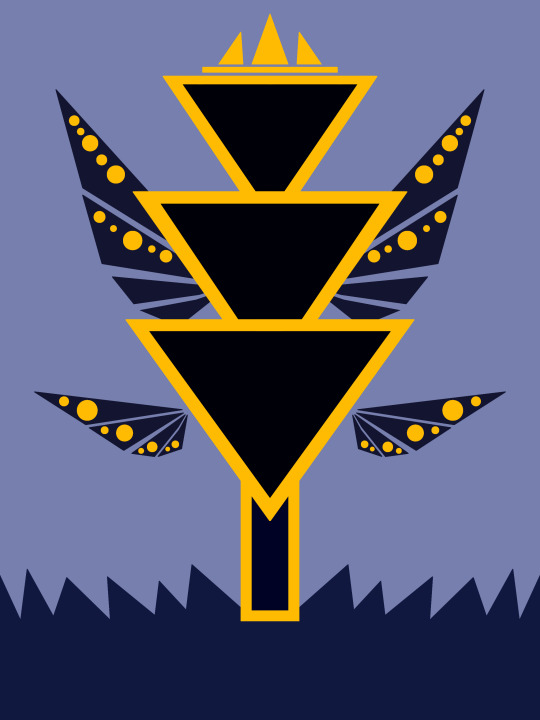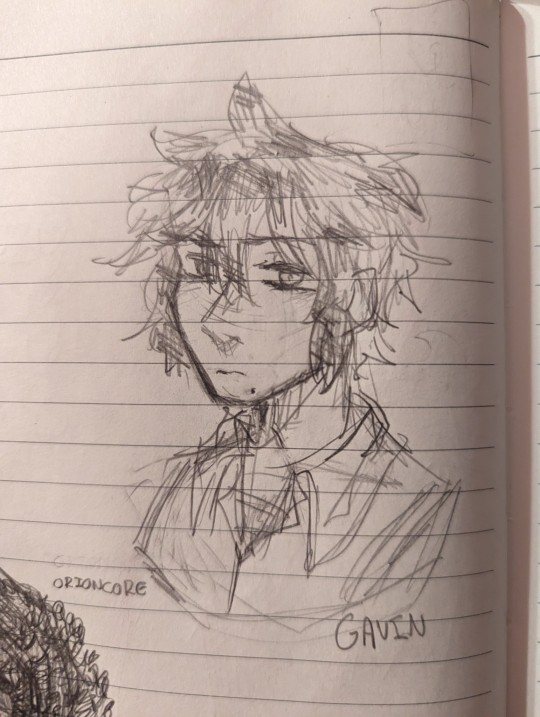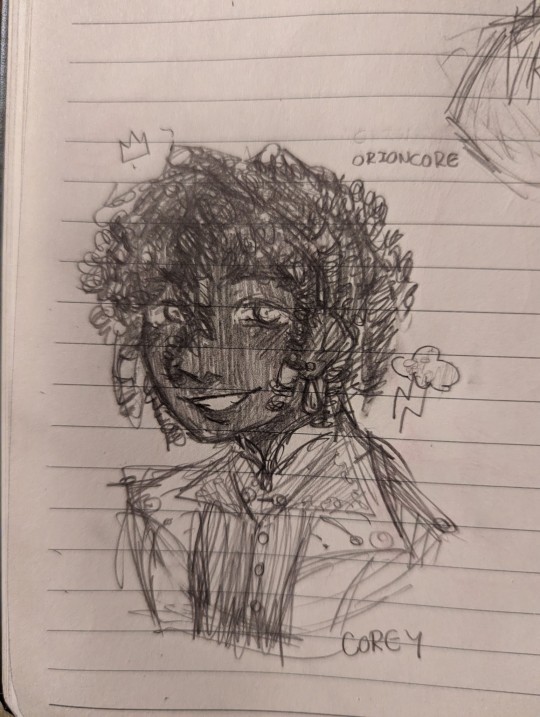#Divum
Text

Oh look! A tree!
(for some context this "tree" is in my jsab au and in my tpc au)
#jsab au#jsab#Jsab oc#Divum#Lord Divum#tpc au#Tpc#my art#oc#Just shapes and beats#The Corruption of Hate#The Crimson Nightmare
11 notes
·
View notes
Text

Soulmates [derogatory]
#my art#zenos yae galvus#zenoswol#zenohika#contemptor divum#and also possibly#pius canis#WoL Claude Dubois#kiss day#which was a few days ago I think?#There's a lot of art prompt challenges going on rn. Or at least I think there are. I'm on vacation.#art
9 notes
·
View notes
Text
doodled some guys from clarity


I don't draw the boys much in comparison to some of the others but here's two o them
simple explanations abt them below :)
Gavin Tueor
17, bi, cis man (he/him)
element is water
somehow pulls (I'll post abt his gf eventually)
stubborn and a bitch
Eli's ex-best-friend (the two are Not on good terms for reasons I will eventually explain)
jumps to conclusions often
has an older brother who is a solider (the two rarely see each other)
kind of a teacher's pet (idk how else to phrase it) but also disrespectful to authority, it depends on whether or not he respects the person
Corey Divum
16, gay, trans man (he/him)
element is lightning
adopted son of the king, is a prince but is shockingly (ha) casual about it
youngest of 3 siblings (all are adopted)
tech savvy and very clever
still getting the hang of his affinity and has a tendency to shock people upon physical contact (nothing severe)
hopeless romantic tbh
#ori ocs#ori art#the r in orion stands for rambles#oc story: clarity#oc: corey divum#they're both so silly to me except gavin isnt exactly the best person ever 💀💀#corey has done no wrong though hes just chilling#it is too late for this shit but hey its fine#eepy now#no id#oc: gavin tueor
5 notes
·
View notes
Text
Higher Beings Preview
So, in addition to the mortal Hetrans, there are other, supernatural creatures that go under a super-category called, "Higher Beings." Their label comes from the fact that they are believed to live a more complex life within nature, for better or for worse, and are usually supernaturally powerful. Someone can be born a Higher Being, or be created.
Here's the list:
• The Formless Ones (formless forces of the Universe)
• The Drakones (the lóng gods)
• The Ancient Peoples (Currently contains the Serpent Folk (based on Nagas) and their special kin, the Grande Serpents (based on legendary and giant snakes) and Noble Serpents (basilisks))
• Demons (expanded further below)
• Divums (expanded further below)
• Fox Spirits (based on Hulijing/Kitsune)
• Shas (based on the Set animals and Sutekh himself from Ancient Egypt)
• Vishaps (based on sea dragons of myth)
Possible other Higher Beings are:
• Wivers (wyverns)
• The Twinned Foreigners
Divums and Demons
Divine Creatures are benevolent spirits, collectively called "divums:"
• Blessed Spirits (People that have ascended through supernatural means, whether it be through gods or personal willpower)
• Drakonic Horses (based on the Longma)
• Listening Beasts (based on the Diting)
• Medley Singers (based on the Luanniao)
• Motley Dancers (based on the Fenghuang)
• Royal Unicorns (based on Qilins)
• Scaled Specters (based on aosagibi)
• Serpent Birds (based on Quetzalcoatlus and amphitheres)
• Variegate Hound (based on Theows and reindeer)
• Warding Panther (based on the Pixiu)
There will be more added in the future...
Demonic Creatures are malicious spirits, collectively called "demons:"
• Accursed Spirits (fallen Blessed Spirits)
• The Corrupted Eight Principles (corrupted Bagua elements in the wild. Totally not a Jackie Chan Adventures reference)
• The Four Perils/Evils
• King of the Damned (the demon king)
• Vampires
• Winteko, and the Cannibals it spawns
There will be more added in the Future...
#eleturn#higher beings#formless ones#drakon gods#ancient people#demons#divums#fox spirits#wivers#shas#vishaps#foreigners#wip
1 note
·
View note
Text








Agios Es Lucifer Divum Et Vorsipelle ✴️
#lucifer offering#lucifer deity#luciferian witch#lord lucifer#luciferism#luciferian#lucifer#lucifer devotee#theistic luciferianism#lucifer angel#witchcraft#pagan#paganism#moodboard#deity worship#demonolatry#demonology
64 notes
·
View notes
Text
Divine Creusa
Time to put speculation hats on, everyone! This one’s a bit of a stretch maybe but stay with me on this. This one’s also a bit Servius-heavy, I’m afraid, so let’s treat this as a case study of what was the popular interpretation in the 4th/5th century AD, and not as an absolute truth. Even if I am correct.
Creusa’s final appearance to Aeneas as a ghost is an impressive and touching scene. It is, however, notable that Aeneas does not meet Creusa in the Underworld later, and I do not think (or at least I hope) that Vergil didn’t simply forget her. So why isn’t she in the Underworld, she is dead, isn’t she?
Is she?
Well, yes, she is most certainly dead. But reading Servius’ commentary piqued my interest with a couple comments he made about her final appearance and prophecy.
So, Creusa’s prophecy is arguably the final push for Aeneas to leave Troy behind and start his journey towards Italy. This promised fate cannot happen, if Aeneas does not leave Creusa behind (as she promises him a kingdom and a royal wife – and he can’t have that wife if he already has one (let’s return to this in tomorrow’s post)). Creusa makes this very easy for him by disappearing into thin air, and he is unable to embrace her (Servius kind of heckles Aeneas for this: MANUS EFFUGIT IMAGO quasi imago, quae non tenetur. naturale enim est, ut non possit teneri; it is like an image, that cannot be held. It is natural, that he can’t hold it. Idiot. Serv. Aen. 2.793).
Vergil makes it clear that Creusa has moved on to the Great Mother’s care and has not become the slave of Greek matrons. She appears to Aeneas as a “in a form greater than known” (nota maior imago) – this kind of depiction of a person appearing as “larger than life” is often reserved for immortals (notably Venus herself appears to Aeneas this way). While it was a delight to try and translate imago, simulacrum and umbra with the limited vocabulary that my native language has for these, Servius turns our attention to the word simulacrum:
With the word simulacrum [Vergil] expresses apotheosis, as simulacra is for gods, umbrae is for the Underworld. (Serv. Aen. 2.772)
INFELIX SIMULACRUM per simulacrum autem apotheosin ostendit, quia simulacra deorum sunt, umbrae inferorum.
Maior imago also gets an explanation:
MAIOR IMAGO quia umbra maior est corpore. et per hoc mortuam vult ostendere, aut ex homine deam factam.
Because a shadow is larger than the body [of a mortal]. And through this [Vergil] wants to show that Creusa is dead, or that she’s been made from human into a god.
Vergil explicitly wants to associate Creusa with the divine through the use of simulacra. In addition, maior imago suggests immortality – that’s why she’s not in the Underworld: she never made it there.
Creusa’s prophecy is also treated with the same gravity as other divine signs. Book III starts with the Trojan refugees embarking on their journey with auguries agimur divum (3.5), the auguries of gods, and here Servius explains:
AUGURIIS AGIMUR DIVUM. pro ostentis, id est ex flamma quae tempora Ascanii pasta est, cursu stellae, Creusae admonitione, quae dixit <II 781> et terram Hesperiam venies.
Vergil uses the word augurium instead of ostentum (portent): it is the flame, which sparked from Ascaniu’s head, the way of the star, and Creusa’s reminder “and you will go to the land of Hesperia”. (Serv. Aen. 3.5)
Aeneas sails on the sea per auspiciis maioribus, under higher auspices – Servius explains maioribus thusly:
MAIORIBUS caelestibus propter sideris cursum, cuius fuit explanatio per Creusam.
Maioribus means caelestibus, heavenly, meaning the way of the star, which gets its explanation from Creusa. (Serv. Aen. 3.374)
Creusa’s prophecy is the same as the signs from heaven, the star that showed the way out of burning Troy, the flame on Ascanius’ brow. Her prophecy is divine and absolute, and so, thereby, is Creusa. She has become the servant of the divine Great Mother and with that she has been raised to the ranks of immortals.
(Servius does also point out that Aeneas fails to listen to Creusa’s prophecy… she pretty clearly says that he’s supposed to go to Italy, but they go to Thrace instead. And then Crete. And then a bunch of other places. Aeneas is kind of a dummy sometimes and this WILL bite him in the ass later.)
(Also, I can’t find the post rn but hey the person who speculated that the Creusa in the final scene isn’t her at all but Venus instead? You might be onto something and you’re responsible for this chapter in my thesis so thank you)
I planned to post my final Creusa post today but it requires some reading before I start spouting my speculative bullshit – this was the part I had to leave out of my thesis (because boo philology (I’m kidding philology I love you))… BUT tomorrow, we talk about Creusa’s meaning and symbolism, and I get to peer review the fun tags you’ve left for me in the previous posts :3c
#creusa#aeneid daily#the aeneid#wildkitte#please take this humble speculation#it is now my favourite headcanon ngl#because it is a crime that Aeneas does not meet Creusa in book 6#the only way i can accept this is that she simply wasn't available
21 notes
·
View notes
Text
indigitem aenean scis ipsa et scire fateris deberi caelo fatisque ad sidera tolli......... mortalin decuit violari vulnere divum?.........
#sorry for aeneid book 12 posting in latin it will happen again#since my exam is on monday and i need to uhhh. learn the whole book in latin#anyway. these ^ quotes from when jupiter is talking about aeneas' fate are soooo good#he's owed to the sky and raised to the stars by fate......
4 notes
·
View notes
Video
youtube
Lucifer, Angelic Aspect · Enn Meditation Chant [Also Luxferro, Lucifero,...
Enn: Agios Es Lucifer Divum Et Vorsipelle.
#youtube#lucifer#mediation#satani#enn meditation#luxferro#angelic#Lucifero#Luciferro#sister satan#enn
4 notes
·
View notes
Text
“In poem 64 of Catullus one comes across the absence of Apollo from the wedding scene. In the poem the wedding of Thetis to Peleus holds a prominent place, narrated in detail. According to Catullus, Apollo and Artemis scorned Peleus and did not wish to celebrate the wedding of Thetis. The lines in question read (64, 299-303): Inde pater divum sancta cum coniuge natisque advenit cáelo te solum Phoebe relinquens. Unigenamque simul cultricem montibus Idri. Pelea nam tecum pariter soror aspernata est. Nec Thetidis taedas voluit celebrare iugales. Then came the father of the gods with his divine wife and sons leaving you, Apollo, alone in heaven and with you your sister who dwells in the heights of Idrus; for as you did, so did your sister scorn Peleus, nor wanted to be present for the nuptial torches of Thetis.
This absence of Apollo and Artemis from the wedding has no precedent in literature. On the contrary, Apollo and Artemis are present in all narrations of the wedding from the Iliad onwards. Apparently, it was Apollo who, more than Artemis, had a well-established place in the narration of the wedding before Catullus 64 for two main reasons. Firstly, because Apollo was known to have a close relationship to Thetis (cf. Quintus Smyrnaeus III, 150) and, secondly, because it was he who occasionally made/sung some kind of prophecy for Achilles (cf. fr. 350 Radt). As a result, the choice of Catullus to make Apollo absent and keep him in the background of the refusal to attend the wedding seems suspicious. It is as if Catullus hides Apollo behind Artemis with unpersuasive excuses of no precedent in tradition and insufficient to convince the sceptical reader. It is the word tecum , however, that is the keyword of the passage, as far as the motive of the gods for non-attendance is concerned. Accordingly, Artemis simply shares Apollo's reasons for not attending. Several suggestions have been attempted to explain this absence in recent years. Thomson in his commentary on Catullus lists three possible explanations. Firstly, that Apollo cannot be present because he is to kill Achilles at Troy. This, however logical and at the root of the problem, had not stopped all previous poets from including him and some even giving him a special role (cf. Iliad XXIV; A. fr. 350), although his intervention in the death of Achilles was an old and recurrent theme in tradition. The second suggestion is that the siblings did not approve of the marriage of Thetis to a mortal. But, as Thomson rightly wonders himself, why these two, alone of all gods, should not approve? To advance Thomson's doubts, one could add that the decision for this wedding was taken by Zeus himself and it is well-known that Thetis originally opposed to her union to a mortal (cf. II. XVIII, 429-34). It is, therefore, difficult to see how Apollo and Artemis could disapprove of Zeus' decision or punish Thetis for it. Thomson's third suggestion is related to the fact that the wedding is occasionally presented in literature as taking place in storm and darkness. Thomson suggests that perhaps there was no place in this scenery for the god of sun. But, the wedding in Catullus 64 does not take place under such conditions and, therefore, this last explanation seems to be highly hypothetical.
It has been suggested early in 1900 by Reitzenstein that the absence of Apollo was a deliberate attempt by Catullus to defend the God against the criticism, placed in the mouth of Thetis by Aeschylus (fr. 350 Radt).15 Although the relation between the version of Catullus and that of Aeschylus was correctly spotted, the issue should not be confined to a tight one to one comparison. The Iliad and Quintus are also important in our research. Moreover, there is more to be discussed concerning the motivation of Catullus than an undefined wish to acquit a god of some accusations. . . . Catullus reassesses a question found in Iliad and Aeschylus, and later in Quintus, on the existence of an ideal world where gods are just and true. This is what the presence, or absence, of Apollo is all about from its very first encounter in Iliad. Iliad and Aeschylus allowed a deceptive Apollo that had manipulated another god and, indeed, one that was a close friend of his. The Latin poet, in a way, reinvented the problem by turning the problematic presence of Apollo at the wedding party of Thetis, as found in preceding tradition, into an equally problematic absence. In the poetry of Catullus, the absence of Apollo, the lying prophet and the imminent murderer of Achilles, becomes a symbol at Thetis' wedding party. It stands for the duplicity of gods and the lack of truthfulness, even at a divine level.”
- Apollo at the wedding of Thetis and Peleus: Four problematic cases - Ioanna L. Hadjicosti
4 notes
·
View notes
Text
Earth, circa 2000.
The sound of a portal flashing forth from a rift in space could be heard what appeared to be an abandoned site. Out of it, a man emerged-- His existence on this planet as enigmatic as ever. Of many of his escapades here, some knew him as the mystery-laden agent from a war that ravaged much of this world-- One won by what could be considered the worst of tyrannical powers on this planet ever witnessed. It was a miracle that it was undone, however, and that things have, in comparison, quieted down.
Well, this world still has its fair share of problems, especially with how cults dedicated to Davoth and a host of his demonic subjects surfaced and grew each time. Kahann would never forget about the horrors he had to deal with in the depths of Wulfburg, many years back. Ra’ltha Va’Tuum was only the beginning of troubles that would inevitably drag Earth to his former homeworld’s chaos, however, and taking down many more was a lonesome duty.
There it was, right in front of his eyes-- The Gate of Divum. To think this was built in what would be modern-day North America. This alone was proof that Earth was once part of vast inter-galactic colonies of the Jekkadi Empire.
Of course, he had heard that his own people, the Argenta, attempted to make Earth their colony. That only ended in failure as this planet was too wild for them to tame back then, and almost everyone joining expeditions to this planet left. Those who remained, became assimilated with humans, many of whom had done away with their Sentinel identity.
“...All these ages coming and going, and it’s still here.” The Primeval began, touching the portal’s control panel. Of course, the energy slot was empty-- It depended on power imported from Jekkad pre-corruption to make it operational. “The Gate of Divum. The only portal within this star system for us to return to Immora, back in the day...”
He remained silent, deep in a myriad of thoughts.
“So many things have changed since the empire fell.” While he said this to no one in particular, Kahann mentioned his older twin, who now must have been imprisoned, somewhere in Hell. “Earth is left to its own devices now, but who’s to say it could be a bad thing?”
“Then again, this is one of your colonies. Of course, you’ll do anything you want with it, if you could. I should have no right to interfere.” He sighed. “But with what you’ve become and what you’ll intend to do with it...”
“Just because you can, doesn’t mean you should.” His eyes stared down towards the energy slot. “I warned you about what would happen if you continued with your quest for their immortality. Some of your own people did the same. You just wouldn’t listen then, and I doubt you’ll listen now. Once your people have enough power to do it, you will command them to start wreaking havoc across galaxies. Doesn’t matter if it would be worlds once under your control or otherwise.”
“This portal will be found, sooner or later. Who knows what people will do with it, and of course, it won’t bide well because of its connection to our home.”
He turned away from the portal’s control panel. “Like it or not, this insanity will stop. If it’s not by my hands, then it will likely be by someone else’s.”
“I hope you’re prepared for that, brother. Then, you will answer for what you have done.”
Kahann summoned a portal back to wherever he would go, leaving the current ruins of the ancient slipgate quiet, once again.
#Welcome (IC)#Covers are all they judge books by today (Drabble)#Cerulean Heir (Kahann)#Ruler of Hell (Davoth)#ask to tag tw#war tw
2 notes
·
View notes
Text
Introduction

Welcome to the Forgotten Archives,
Take a look around and stay a while.
✦ ⠂⠂୨୧
We have MaDD (Maladaptive Daydreaming). This is a blog specifically dedicated to posting about our paracosms. It is highly indulgent but who knows maybe you'll find something you like here.
TWs will be tagged + there will eventually be a tag directory.
Feel free to send any questions you might have, we'll be glad to answer them. It can be related to our paracosms or paras, or just related to MaDD in general. (You can also talk to us about your own if you want!)
• ───── ୨୧ ───── •
Paracosms:
Original:
[NONSENSE], Lorixia, Born of Ink
Fictparacosms:
Tag Directory
Divum, Gods and Cults (Genshin); The tradegy of Areila Graves (IDV); a bunch more.
• ───── ୨୧ ───── •
# nonsense - The [NONSENSE] Paracosm Tag
# Born of Ink - The Born of Ink Paracosm Tag
# Lorixia - The Lorixia Paracosm Tag
1 note
·
View note
Text

Saw a few other people drawing this with their WoLs and decided to jump on that band wagon.
Inspiration below readmore ⬇

#my art#ffxiv#zenoswol#zenos yae galvus#I'm down bad for the murder prince y'all it's dire#BIG. MAN.#BIG#sketches#WoL Claude Dubois#contemptor divum#why is it pink? I don't know#memes#I may or may not have painstakingly made to-scale models of my WoL and Zenos so I could pose them like barbies and make them kiss and stuff#art
11 notes
·
View notes
Text
'Crimine quo merui, iuvenis placidissime divum, quove errore miser, donis ut solus egerem, Somne, tuis? tacet omne pecus volucresque feraeque et simulant fessos curvata cacumina somnos, nec trucibus fluviis idem sonus; occidit horror aequoris, et terris maria adclinata quiescunt. septima iam rediens Phoebe mihi respicit aegras stare genas; totidem Oetaeae Paphiaeque revisunt lampades et totiens nostros Tithonia questus praeterit et gelido spargit miserata flagello. unde ego sufficiam? non si mihi lumina mille, quae sacer alterna tantum statione tenebat Argus et haud umquam vigilabat corpore toto. at nunc heu! si aliquis longa sub nocte puellae bracchia nexa tenens ultro te, Somne, repellit, inde veni; nec te totas infundere pennas luminibus compello meis (hoc turba precetur laetior); extremo me tange cacumine virgae, sufficit, aut leviter suspenso poplite transi.'
Same.
#org#statius#ad somnum#it only took me 9 years to get round to reading it#also this new tumblr editor is so bad i gave up on trying to correct the format#who doesn't love poetry compressed into one long chunk
0 notes
Text
Everyone once dreamed of living in the heart of Mumbai, Goregaon, where they can feel the spirit of the city pulse through their veins! This lively suburb is a vibrant, exciting neighbourhood offering an authentic all-rounder living experience. Living in Goregaon means embracing the fast-paced lifestyle of Mumbai, with the sights, sounds, and smells of the city right at your doorstep. You'll have endless opportunities to explore new places, try new foods, and experience everything this incredible city offers. And when you're ready to come home, you'll find some of the most luxurious residential projects in the city waiting for you. One of the standout properties in Goregaon is Divum, the ultimate definition of an ideal residency. It offers world-class amenities and modern infrastructure, ensuring a comfortable and luxurious living experience. But what sets it apart from other residential projects in the area? Let's find out!
0 notes
Text
Disciple of Venus Invocation

Ave Ashtar Lucifer!
Hail Astar Inanna!
I follow the Venus Star
Venus in her names of Ashtar Lucifer
The hidden flame, master of gender,
Queen of Heaven, Goddess of beauty,
we are vessels of your eternal bliss!
Hail Inanna!
Hail Ishtar!
Hail Attar! Athtar! Astar!
Hail Ashtar!
Hail Ashtarot!
Hail Astarte!
Hail Aphrodite!
Hail Phosphorus!
Hail Eosphorus!
Hail Hesperus!
Hail Lucifer!
Agios Es Lucifer Divum Et Vorsipelle
Renich Tasa Uberaca Biasa Icar Lucifer!
Lucifer, Lucifer, Lucifer!
All praise to the Rebel Star!
All hearts are hers!
He who rises to the glory of the Gods!
God of the Underworld,
Liberator, Illuminator,
bestow us your blessings, for we are yours!
In Nomine Dei Nostri Ashtara Luciferi!
Hail Almighty Venus!
In Venus name,
So Blessed Be!
✴️


#venus#lucifer offering#luciferian witch#luciferism#lucifer#lucifer devotee#theistic luciferianism#lucifer deity#lord lucifer#aphrodite devotion#aphrodite's altar#aphrodite deity#lady aphrodite#aphrodite worship#attar deity#attar#athtar#ashtar#pagan#paganism#inanna#ishtar#astarte#astarorh#devotional#invocation#witchcraft#magick#demonology#demonolatry
33 notes
·
View notes
Photo

From @divumwines - the 2017 Monterey Single Vineyard Chardonnay. After seeing 9 months in French Oak, this sustainably farmed Chardonnay is showcases mango and pineapple and has a light buttery character via the oak and malolactic fermentation. The acidity is beautiful and while this is drinking wonderfully now; cellaring to 2023 would be very interesting. It finishes long with just a touch of bitterness. Balance can be a challenge but not here and for $28 retail for single vineyard California Chardonnay, this is a steal! Available from @corkfinewineyyc from @fluidimports #divum #chardonnay #singlevineyard #monterey (at Tuscany) https://www.instagram.com/p/CDmq9LgJVqe/?igshid=1qgeshowpddtd
0 notes